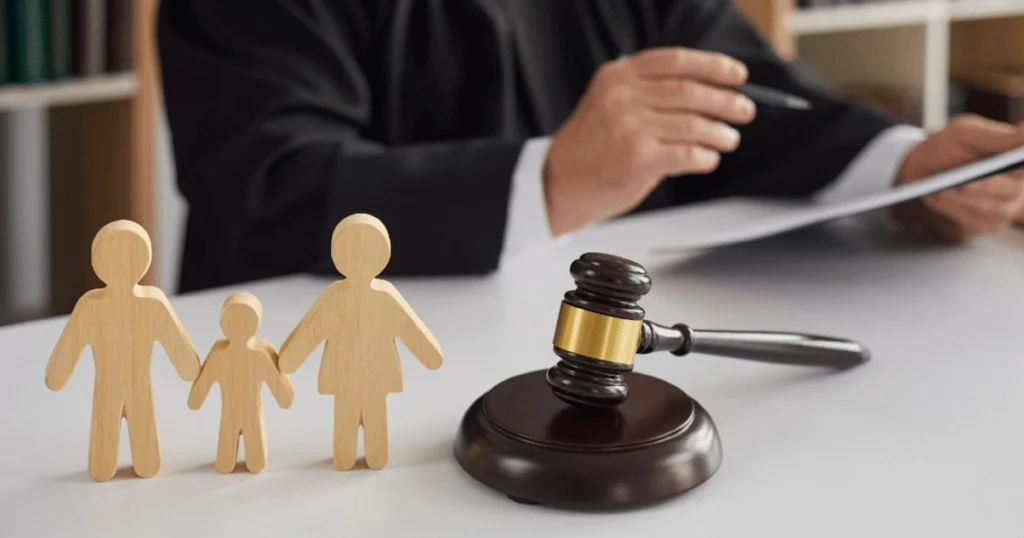Thinking about your family’s future? You might wonder what happens to your stuff and loved ones when you’re gone. Estate planning is key to prepare for the unexpected. It makes sure your wishes are followed and your family is safe.
With a good estate plan, you can share your stuff how you want. This avoids stress and delays. About 60% of Americans don’t have a will. This means state laws might decide what happens to your stuff.
This shows why estate planning is so important. It lets you choose what happens to your estate, not chance. A detailed estate plan can cut down family fights over money by half. It also makes sure your loved ones get what you want for them.
Estate planning lets you set up a trust to cut down on taxes. It also helps your assets go to the right people. You can pick who makes financial and medical decisions for you. Making an estate plan gives you and your family peace of mind. You know your wishes will be followed and your family will be safe.
Table of Contents
Why Estate Planning for Families Isn’t Optional

Picture this: you’re gone tomorrow. Car wreck, heart attack—something fast and unexpected. Your spouse is sitting at the kitchen table, staring at bills, no idea where the mortgage paperwork is. Your teenage son’s asking who’s paying for his school trip next month. If you’ve got a plan—a will, a trust, something—those questions have answers. If you don’t? The state takes over. It’s called intestate succession, and it’s like handing your family’s future to a stranger with a rulebook.
I once worked with a guy—mid-30s, two kids, decent job—who died without a will. His wife thought she’d inherit everything. Nope. State law split it between her and the kids, but since the kids were minors, the court appointed a guardian for their share. Cue months of legal fees, delays, and a wife who couldn’t touch half their savings. That’s not rare—it’s what happens when you skip estate planning for families.
Here’s the kicker: about 60% of Americans don’t have a will . That’s millions of families rolling the dice, hoping the government’s default plan matches their wishes. Spoiler—it usually doesn’t. Estate planning isn’t about how much you have; it’s about who you’re leaving behind and what they’ll face without you.
Estate Planning for Families: The Basics Every Family Needs
Alright, let’s break it down. What does estate planning for families actually look like? It’s not one-size-fits-all, but there are some core pieces every family should have. I’ve helped draft these for clients, and trust me, they’re worth the effort.
A Will: Your Starting Point
A will is the bare minimum. It’s where you say, “My house goes to my spouse, my savings to my kids, and my brother’s the guardian if we’re both gone.” It’s simple but powerful. Without it, the state decides who gets what—and who raises your kids. I’ve seen courts pick guardians parents wouldn’t trust with a goldfish, just because no one wrote it down.
But wills aren’t perfect. They go through probate—court supervision that can take months, sometimes years. It’s public, slow, and costs money—think 3-7% of your estate in fees. Still, it’s better than nothing.
Trusts: The Game-Changer
If you want to skip probate, a trust is your best friend. A living trust lets you manage your assets while you’re alive, then passes them straight to your family when you’re gone—no court, no fuss. I worked with a family—six kids, a farm worth millions. We set up an irrevocable trust, saved them a fortune in taxes, and kept the land safe from creditors. Trusts also let you set rules—like giving your daughter money at 25, 30, and 35 so she doesn’t blow it all at once.
Funding the trust is key, though. You have to transfer assets into it—like retitling your house. Forget that step, and it’s just an empty shell.
Powers of Attorney: Your Backup Plan
What if you’re not dead, but can’t decide? Stroke, accident, dementia—life throws curveballs. A power of attorney (POA) lets someone you trust handle your finances or medical decisions. Without it, your family’s stuck begging a judge for control. I’ve seen this firsthand—a client’s dad had a stroke, no POA. His wife spent thousands on a guardianship case just to pay his bills. Brutal.
Healthcare Directives: Your Voice When You’re Silent
This one’s personal. A healthcare directive says what you want if you’re incapacitated—life support or not, feeding tubes or not. I’ve sat with families guessing what Dad would’ve wanted because he never wrote it down. One daughter told me, “He loved hiking—he’d hate being stuck in a bed.” But no proof, so they kept him on machines for months. Write it down. Spare them the guesswork.
Kids: The Heart of Estate Planning for Families
If you’ve got kids, this is where it gets real. Estate planning for families with minors isn’t optional—it’s a lifeline. Let’s talk guardianship first. Name someone in your will, or the court picks. I’ve seen kids end up with distant relatives because parents assumed, “Oh, my sister will step up.” Don’t assume—decide.
Then there’s money. Kids can’t own property outright until 18, so you need a trust. You pick a trustee—someone reliable—and set rules. Maybe it’s college funds at 21, or small payouts to keep them grounded. Life insurance and 529 plans are clutch here too. I’ve worked with young parents who skipped this, thinking they had time. Then a crash hit, and grandparents were left scrambling. Don’t do that to your people.
Special needs kids? That’s another layer. A special needs trust (SNT) lets you provide for them without cutting off Medicaid or SSI. Mess this up, and a standard inheritance could disqualify them from benefits. I’ve seen families hire specialists for this—it’s worth every penny.
Estate Planning for Families Taxes: The Silent Thief
Taxes sneak up fast. In 2025, you can pass $13.99 million tax-free, per person. Sounds huge, right? But that drops—maybe to $7 million—in 2026 when the Tax Cuts and Jobs Act sunsets. If your estate’s near that—house, savings, life insurance—you’re looking at a 40% tax hit on anything over. Millions gone.
I’ve seen clients race to beat this clock. One couple with rental properties shifted assets into trusts last month—saved their kids $2 million in taxes. Gifting works too—$19,000 per person in 2025, no tax. Timing matters. A paralegal can’t give tax advice, but we can flag this stuff and get you to a planner who can.

The Family Talk: Don’t Skip It
Here’s where estate planning for families gets messy—emotions. You’ve got your plan, but if your family’s clueless, it’s a recipe for fights. I’ve seen siblings turn into strangers over a $10,000 heirloom because no one explained why it went to one and not the other. Studies say 60% of wealth transfers fail due to miscommunication.
Tell them who’s executor, who gets what, why you chose it. One client—a widow—spent a year untangling accounts because her husband never shared the plan. She cried through every meeting. Open your mouth—it’s not morbid, it’s kindness.
Estate Planning for Families: Keep It Current
Life changes—divorce, new kids, a big inheritance. Your estate plan has to keep up. I’ve seen disasters from outdated plans—a guy remarried, didn’t tweak his will, and his ex-wife got half his estate. His new wife? Nothing. Check it every 3-5 years, or after big shifts. A quick $250 update beats a decade of regret .
Digital assets count too—social media, email, crypto. List them, give access instructions. The IRS treats Bitcoin like property, so it’s part of your estate. Don’t let it vanish into the cloud.
The Paralegal’s Role in Estate Planning for Families
As a paralegal, I’m not the lawyer signing off, but I’m the one digging into details—drafting wills, organizing trusts, chasing down titles. We’re the glue keeping it together. I’ve worked with families who thought estate planning was a DIY job—online templates for $40. Sure, it’s cheap, but one typo can unravel everything. I’ve fixed those messes too.
We spot gaps—like missing guardianship or outdated beneficiaries—and nudge you toward pros when taxes or special needs get tricky. It’s not glamorous, but it’s satisfying knowing a family’s covered because we got it right.
Estate Planning for Families: Common Mistakes Families Make
Let’s talk pitfalls. Not updating’s a big one—60% don’t tweak plans after life changes. Forgetting to fund trusts is another—over 50% sit empty. Picking the wrong trustee or executor? That’s a fight waiting to happen. And skipping incapacity docs? You’re begging for a court battle. I’ve seen all these turn small oversights into big problems.

The Cost of Doing Nothing
Here’s the math: a basic estate plan costs $1,500-$3,000. Probate without one? $15,000-$20,000, plus 12-16 months of stress. Add taxes—$8.3 million on a $10 million estate growing 5% over 15 years. That’s money your kids lose because “later” never came. I’ve counseled families who wished they’d spent the $3,000 upfront. Regret’s a tough pill.
Conclusion: Securing Your Family’s Future Through Estate Planning
Estate planning for families isn’t about wealth—it’s about control, love, and clarity. It’s your last say in how your people are cared for. Skip it, and you’re leaving them to chance, courts, and costs. I’ve watched too many families learn this the hard way—don’t let yours be next.
Start small—a will, a POA, a chat with your spouse. Bring in a lawyer, a paralegal like me, maybe a tax pro. It’s not fun, but it’s one of the best gifts you can give. Your family deserves that. So do you.
FAQ
What is estate planning for families?
It’s creating a plan—wills, trusts, powers of attorney—to protect your loved ones and assets if you die or can’t decide for yourself.
Can estate planning for families save on taxes?
Yes, smart trusts and gifting can cut taxes—potentially millions—especially before the 2026 exemption drop.
Source Links
Internal Revenue Service (IRS) – Estate and Gift Tax Informatio
